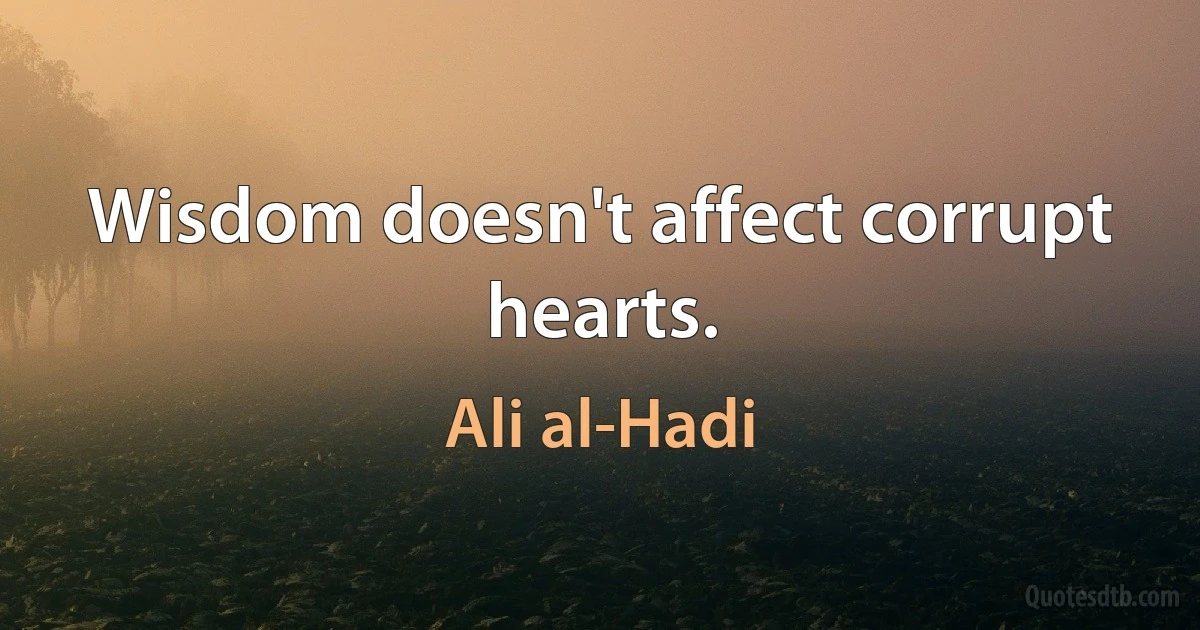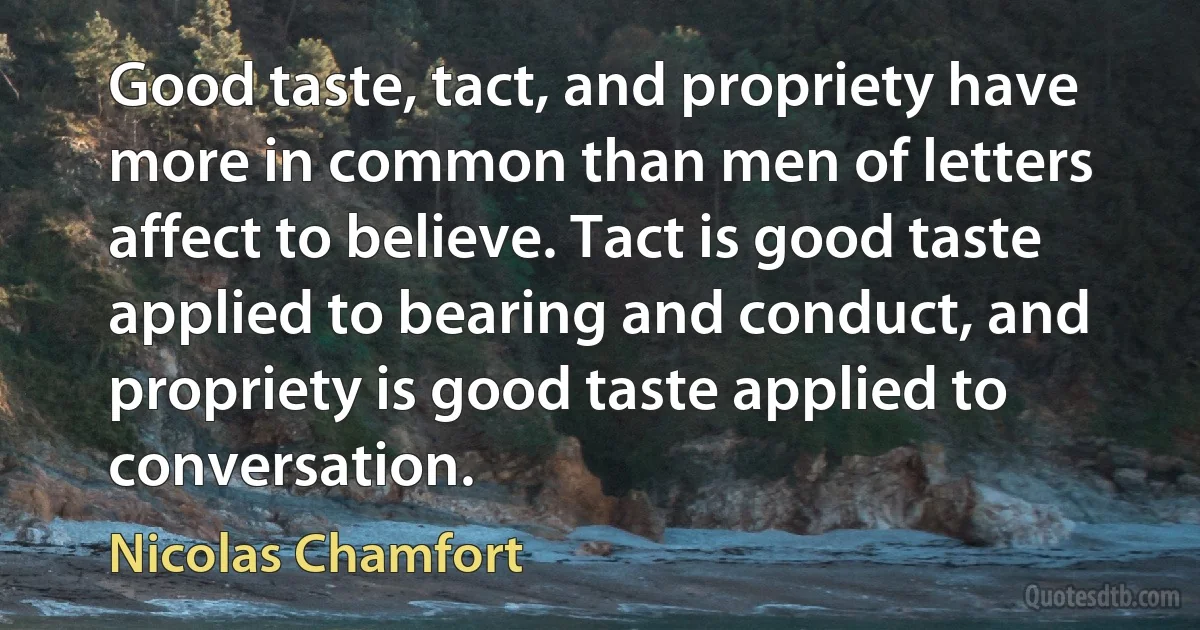Affect Quotes - page 11
What has set the mass in motion for any length of time is then called great. It is given the name of a historical power. When, for example, the vulgar mob has appropriated or adapted to its needs some religious idea, has defended it stubbornly and dragged it along for centuries, then the originator of that idea is called great. There is the testimony of thousands of years for it, we are told. But this is Nietzsche's and Kierkegaard's idea the noblest and highest does not affect the masses at all, either at the moment or later. Therefore the historical success of a religion, its toughness and persistence, witness against its founder's greatness rather than for it.

Georg Brandes
For, for aught we know, or for aught that the new science can say to the contrary, the gods which play the part of fate to the atoms of our brains may be our own minds. Through these atoms our minds may perchance affect the motions of our bodies and so the state of the world around us. To-day science can no longer shut the door on this possibility; she has no longer any unanswerable arguments to bring against our innate conviction of free-will. On the other hand, she gives no hint as to what absence of determinism or causation may mean. If we, and nature in general, do not respond in a unique way to external stimuli, what determines the course of events? If anything at all, we are thrown back on determinism and causation; if nothing at all, how can anything ever occur? As I see it, we are unlikely to reach any definite conclusions on these questions until we have a better understanding of the true nature of time.

James Jeans
Every now and again I get approached by "celebrities" [saying] "oh, you're doing a great job mate, I think it's wonderful what you're doing". Ok, and what you're gonna do? You're gonna make a freaking film now, aren't you? You're gonna make another bloody record! You're gonna stand in front of tens of thousands of people, you're gonna go on chat shows watched by millions of people! Are you gonna bring this subject up yourself? No! Why? "Me, me, me!" "I don't wanna affect my carrer!" I tell you... anyone in the public eye - come nowhere near me unless you are prepared to put your-bloody-self when your mouth is. Walk the talk or walk the other way!

David Icke
Humans can be literally poisoned by false ideas and false teachings. Many people have a just horror at the thought of putting poison into tea or coffee, but seem unable to realize that, when they teach false ideas and false doctrines, they are poisoning the time-binding capacity of their fellow men and women. One has to stop and think! There is nothing mystical about the fact that ideas and words are energies which powerfully affect the physico-chemical base of our time-binding activities. Humans are thus made untrue to "human nature." ... The conception of man as a mixture of animal and supernatural has for ages kept human beings under the deadly spell of the suggestion that, animal selfishness and animal greediness are their essential character, and the spell has operated to suppress their REAL HUMAN NATURE and to prevent it from expressing itself naturally and freely.

Alfred Korzybski
Let us look at the history of Ireland, the history of this chronic government by coercion. What does it mean? It was the naked government of another Kingdom by irresponsible force-irresponsible, that is to say, as regards those whom this system was to affect. Coercion Laws were passed, and were smoothly, described as being for the protection of life and property, of respect for ordinary law, and so on. All those methods proved an ugly failure.

John Morley, 1st Viscount Morley of Blackburn
Youth is learning to read (which is all that one learns in school), and is learning where and how to find what he may later need to know (which is the best of the arts that he acquires in college). Nothing learned from a book is worth anything until it is used and verified in life; only then does it begin to affect behavior and desire. It is Life that educates, and perhaps love more than anything else in life.

Will Durant
The Soviet Union died peacefully but that does not have any affect on what will happen in there [Israel]. The Zionist regime will either go two ways. They will peacefully be disbanded and the Holy Land will become a democracy like our good friend Russia. Or the country will forcefully take on itself like Romania. He [Refering to Nicolae Ceauşescu] did not seem to know (or care) what was happening to the Romanians and the people got sick and tired of this to the point they got rid of the fake regime [Ahmadinejad Denounces Communisim] by force. We do not want this option. We want a peacfully let the people choose what they truely want and everything will go right.

Mahmoud Ahmadinejad
Science is a systematic method for studying and working out those generalizations that seem to describe the behavior of the universe. It could exist as a purely intellectual game that would never affect the practical life of human beings either for good or evil, and that was very nearly the case in ancient Greece, for instance. Technology is the application of scientific findings to the tools of everyday life, and that application can be wise or unwise, useful or harmful. Very often, those who govern technological decisions are not scientists and know little about science.

Isaac Asimov
If the trade is at present carried on to the same extent and nearly in the same manner, while we are delaying from year to year to put a stop to our part in it, the blood of many thousands of our helpless, much injured fellow creatures is crying against us. The pitiable state of the survivors who are torn from their relatives, connections, and their native land must be taken into account. I fear the African trade is a national sin, for the enormities which accompany it are now generally known; and though, perhaps, the greater part of the nation would be pleased if it were suppressed, yet, as it does not immediately affect their own interest, they are passive. {...] Can we wonder that the calamities of the present war begin to be felt at home, when we ourselves wilfully and deliberately inflict much greater calamities upon the native Africans, who never offended us?. "Woe unto thee that spoilest, and thou wast not spoiled when thou shalt cease to spoil, thou shalt be spoiled.

John Newton
We have an odd relationship with words. We learn a few when we are small, throughout our lives we collect others through education, conversation, our contact with books, and yet, in comparison, there are only a tiny number about whose meaning, sense, and denotation we would have absolutely no doubts if, one day, we were to ask ourselves seriously what they meant. Thus we affirm and deny, thus we convince and are convinced, thus we argue, deduce, and conclude, wandering fearlessly over the surface of concepts about which we have only the vaguest of ideas, and, despite the false air of confidence that we generally affect as we feel our way along the road in the verbal darkness, we manage, more or less, to understand each other and even, sometimes, to find each other.

José Saramago
Paint never seems to behave the same. Even the same paint doesn't, you know. In other words, if you use the same white or black or red, through the use of it, it never seems to be the same. It doesn't dry the same. It doesn't stay there and look at you the same way. Other things seem to affect it. There seems to be something that you can do so much with paint and after that you start murdering it..

Franz Kline
When the first big paycheque with 'Dumb And Dumber' hit, I went: 'Gosh, I wonder if this will affect my performance. Will I do a take and think, was that worth $7 million?' But that never happened. If anything, it made me rebel against that thing when people who get rich start playing it safe.

Jim Carrey
Our intelligence and our technology have given us the power to affect the climate. How will we use this power? Are we willing to tolerate ignorance and complacency in matters that affect the entire human family? Do we value short-term advantages above the welfare of the Earth? Or will we think on longer time scales, with concern for our children and our grandchildren, to understand and protect the complex life-support systems of our planet? The Earth is a tiny and fragile world. It needs to be cherished.

Carl Sagan
The conscious side of woman corresponds to the emotional side of man, not to his "mind." Mind makes up the soul, or better, the "animus" of woman, and just as the anima of a man consists of inferior relatedness, full of affect, so the animus of woman consists of inferior judgments, or better, opinions.

Carl Jung



